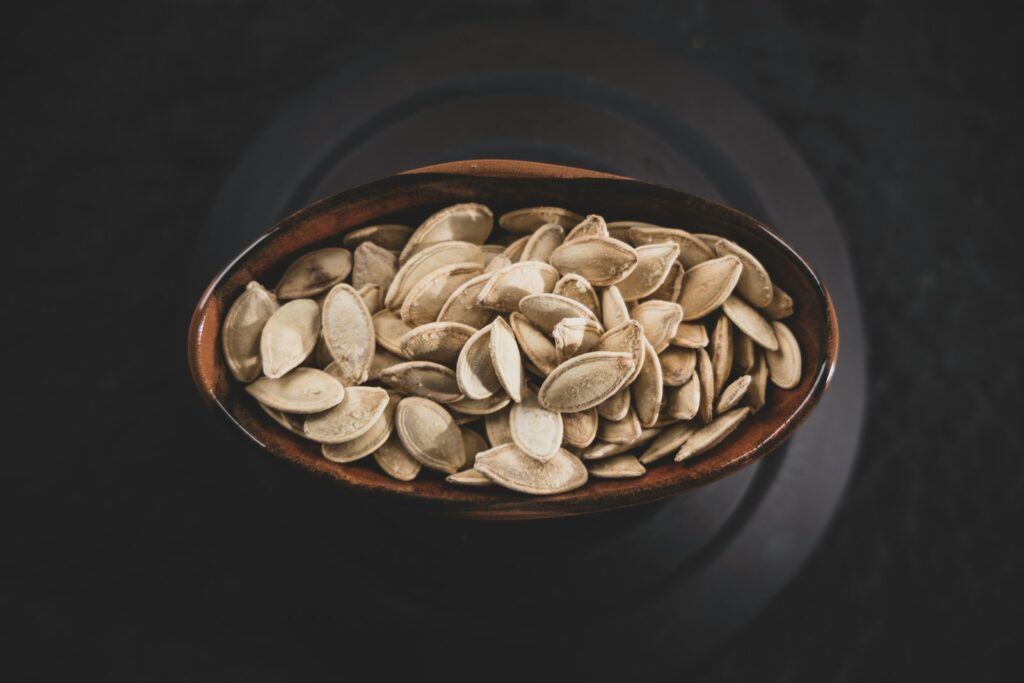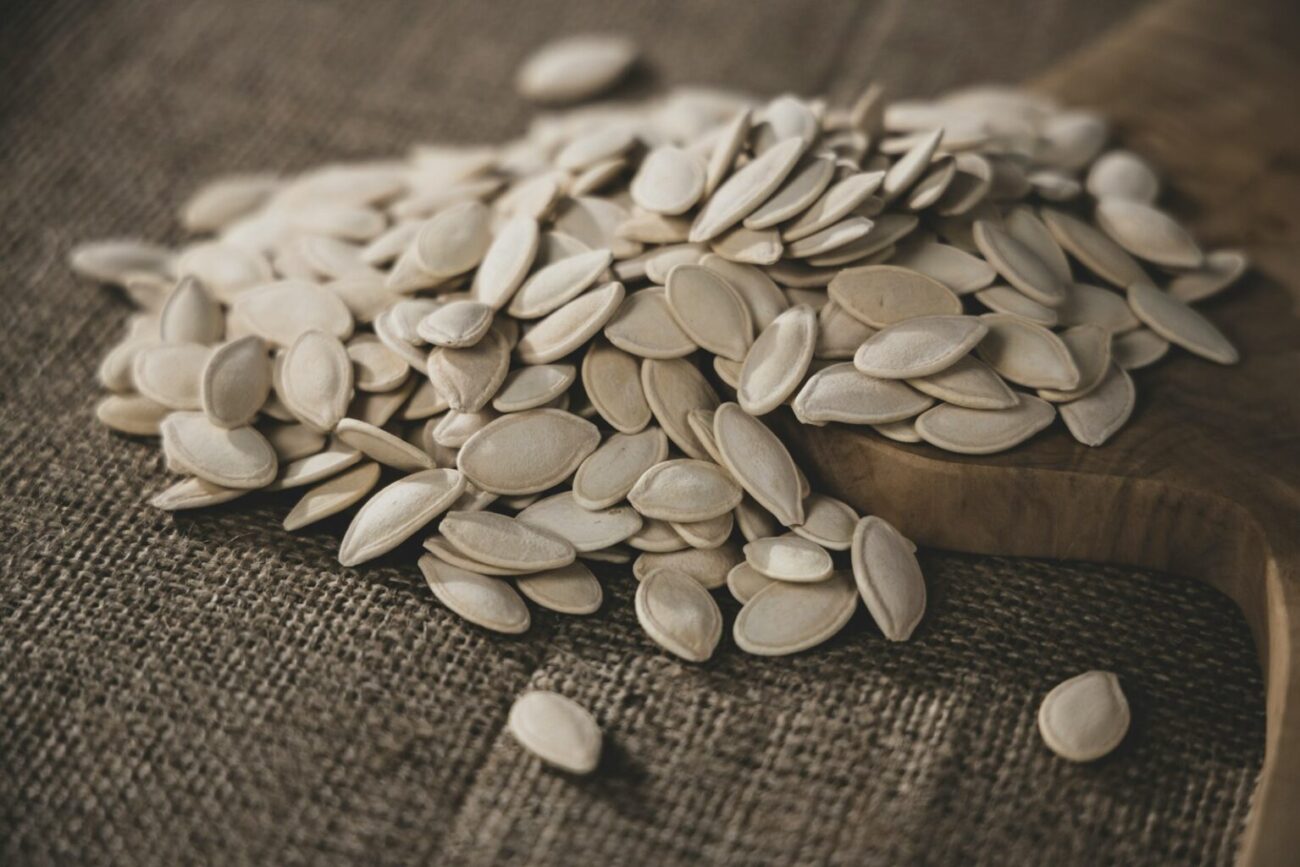Pumpkin seeds, also known as pepitas, are more than just a seasonal snack—they’re a nutritional powerhouse packed with essential vitamins, minerals, and healthy fats. These small but mighty seeds have been enjoyed for centuries, not only for their delicious, nutty flavor but also for their impressive health benefits. Whether you’re sprinkling them on salads, blending them into smoothies, or enjoying them as a standalone snack, pumpkin seeds are a fantastic addition to any diet.
In this blog post, we’ll explore the calorie content, health benefits, and potential contraindications of pumpkin seeds.
Calories and Nutritional Profile of Pumpkin Seeds
Pumpkin seeds are nutrient-dense, meaning they provide a high amount of nutrients relative to their calorie content. Here’s a breakdown of their nutritional profile per 1-ounce (28-gram) serving:
- Calories: 151 kcal
- Protein: 7 grams
- Fat: 13 grams (mostly healthy unsaturated fats)
- Carbohydrates: 5 grams
- Fiber: 1.7 grams
- Magnesium: 37% of the Daily Value (DV)
- Iron: 23% of the DV
- Zinc: 14% of the DV
- Phosphorus: 33% of the DV
- Manganese: 42% of the DV
- Antioxidants: Rich in vitamin E and carotenoids
Top Health Benefits of Pumpkin Seeds
1. Supports Heart Health
- Pumpkin seeds are rich in magnesium, which helps regulate blood pressure and supports heart function.
- Their high levels of antioxidants and healthy fats (like omega-3 fatty acids) reduce inflammation and lower the risk of heart disease.
2. Boosts Immune Function
- The zinc in pumpkin seeds plays a crucial role in immune health, helping the body fight off infections and heal wounds.
3. Promotes Prostate Health
- Pumpkin seeds are a natural source of phytosterols, which may help reduce the risk of prostate enlargement and support urinary health in men.
4. Improves Sleep Quality
- Pumpkin seeds contain tryptophan, an amino acid that the body converts into serotonin and melatonin, promoting relaxation and better sleep.
5. Supports Bone Health
- Packed with magnesium, phosphorus, and manganese, pumpkin seeds help maintain strong bones and reduce the risk of osteoporosis.
6. Aids in Blood Sugar Control
- The high fiber and protein content in pumpkin seeds help stabilize blood sugar levels, making them a great snack for people with diabetes or insulin resistance.
7. Rich in Antioxidants
- Pumpkin seeds are loaded with antioxidants like vitamin E and carotenoids, which protect cells from oxidative damage and reduce inflammation.
8. Supports Digestive Health
- The fiber in pumpkin seeds promotes healthy digestion and prevents constipation by supporting regular bowel movements.
9. May Improve Sperm Quality
- Studies suggest that the zinc and antioxidants in pumpkin seeds may enhance sperm quality and fertility in men.
10. Promotes Healthy Skin and Hair
- The zinc and healthy fats in pumpkin seeds support collagen production, reduce acne, and promote shiny, strong hair.
How to Enjoy Pumpkin Seeds
Pumpkin seeds are incredibly versatile and can be incorporated into your diet in many ways:
- Raw or roasted: Enjoy them as a snack on their own.
- Toppings: Sprinkle them on salads, oatmeal, yogurt, or soups.
- Baking: Add them to bread, muffins, or granola bars.
- Smoothies: Blend them into smoothies for a nutrient boost.
- Trail mix: Combine with nuts, dried fruit, and dark chocolate for a healthy snack.
Potential Contraindications and Side Effects
While pumpkin seeds are generally safe and healthy for most people, there are a few considerations to keep in mind:
1. High Calorie Content
- Pumpkin seeds are calorie-dense, so overeating them can lead to weight gain. Stick to moderate portions (1-2 ounces per day).
2. Digestive Issues
- The high fiber content in pumpkin seeds may cause bloating, gas, or stomach discomfort in some individuals, especially if consumed in large amounts.
3. Allergies
- Although rare, some people may be allergic to pumpkin seeds. Symptoms can include itching, swelling, or difficulty breathing.
4. Phytic Acid Content
- Pumpkin seeds contain phytic acid, which can reduce the absorption of certain minerals like iron and zinc. Soaking or roasting the seeds can help reduce phytic acid levels.
5. Medication Interactions
- Pumpkin seeds may interact with certain medications, such as blood thinners, due to their vitamin K content. Consult your doctor if you’re on medication.
6. Risk of Contamination
- Raw pumpkin seeds can sometimes be contaminated with bacteria like Salmonella. To reduce risk, opt for roasted or cooked seeds.

Pumpkin seeds are a nutrient-packed superfood that offers a wide range of health benefits, from supporting heart health and immune function to promoting better sleep and healthy skin. Their delicious, nutty flavor and versatility make them an easy addition to any diet. However, it’s important to enjoy them in moderation and be mindful of potential contraindications, especially if you have specific health conditions or dietary restrictions.
Have you tried incorporating pumpkin seeds into your meals or snacks?
Share your favorite ways to enjoy them in the comments below! 🎃✨

